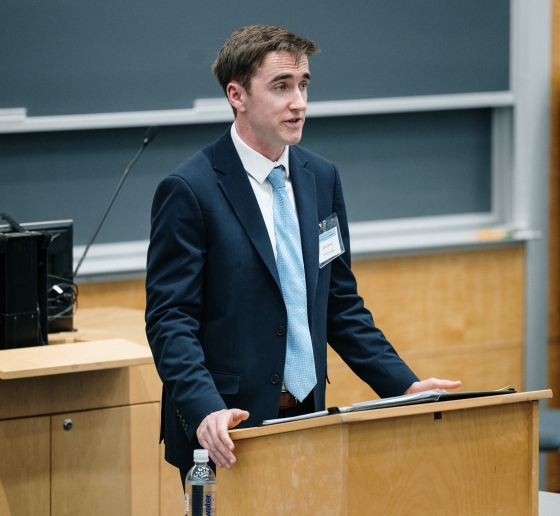Student Spotlight: Jamie Herring LAW ’24, BUS ’24
Herring is a finalist in the 2024 Harlan Fiske Stone Moot Court Competition.

Before coming to Columbia Law School, Jamie Herring LAW ’24, BUS ’24 worked in market analysis for ASR Group (American Sugar Refining). The Harlan Fiske Stone Moot Court finalist—who also won top oralist honors at a regional round of the Philip C. Jessup International Law Moot Court as a 2L—talks about moot court and how his previous experiences led him to the dual J.D./MBA program at Columbia Law.
Hometown: Loughborough, England
Education: A.B. in history and literature at Harvard University; master’s in economics from the University of London
Before Columbia Law: Market analyst for ASR Group (American Sugar Refining) in New York and London
At Columbia Law: Philip C. Jessup International Law Moot Court (top oralist in regional round); research assistant and teaching assistant to faculty including Anu Bradford, Henry L. Moses Professor of Law and International Organization, Dorothy S. Lund, professor of law, and Susan P. Sturm, George M. Jaffin Professor of Law and Social Responsibility
What’s Next: Herring will join Sullivan & Cromwell in New York before spending the 2025–2026 term clerking for Justice Abigail M. LeGrow of the Delaware Supreme Court.
Why did you choose to study history and literature as an undergraduate?
It was an opportunity to engage and study very holistically. History is more far sighted. Literature is more genre focused. With history and literature, you can specialize in a time period. Essentially, you get to study a cultural moment. I chose to study alternative stand-up comedy in 1979 Soho, London.
How did you end up working in the sugar industry after college?
I had two interviews on the same day: one in midtown Manhattan in a very tall building to do finance work within private equity that was very buttoned up, and another at the American Sugar Refining refinery in Yonkers. You walk in, and there’s this gigantic sugar vessel filled with sugar and a warehouse filled with sugar of varying colors. It was like a little kid’s fantasy. And the work was very fun. We looked at everything, from how to reduce our carbon emissions based on which countries we were purchasing sugar from to how we could switch our Italian refinery from palm oil to sunflower oil. It was really hands-on.
What appealed to you about Columbia’s joint J.D./MBA degree program?
While working in sugar, we saw the results of Brexit. You could see how legal regulations affected businesses in a very real way. I became very interested in how government policy affected our industry, and it made me more excited about law school and the regulation side. And, working in business, the MBA felt very natural.
You were in a dramatic club at Harvard. Do you think that’s helped you in moot court?
Absolutely. You have to approach moot court as a conversation and a performance. In theater, the most important thing was developing a connection with the audience. It’s similar in moot court; you have to develop a connection to the judges.
How do you do that?
Don’t be scared. A lot of people—and I used to—get scared of the judges interrupting you or asking you questions. But, if you view it as a conversation and less of a speech, that helps. In a conversation, you expect questions.
Tell us about your work with Professor Anu Bradford.
That was for her book, Digital Empires: The Global Battle to Regulate Technology. She looked at differing models for AI regulation: state-driven in China, market-driven in the U.S., and rights-driven in Europe. It was interesting to see how she took such a complicated topic and tried to apply a quite simple framework to it. I got to see her genius and mastery in doing that.
What keeps you busy outside of school?
I’m running the Boston Marathon, so I run a lot. I also play a lot of Boggle and I’m trying to learn pool, though I’m not very good.